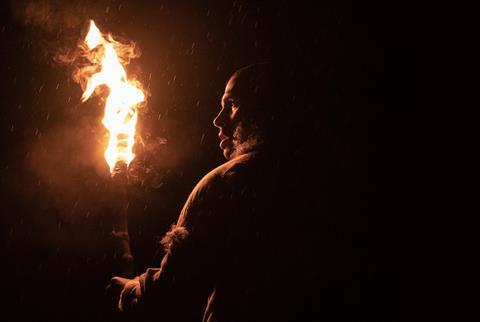A group of our Palaeolithic ancestors does battle against an unseen enemy in Andrew Cumming’s Stone Age chiller

Dir: Andrew Cumming. UK. 2022. 87mins
A group of explorers striking out across an inhospitable landscape are forced to do battle with more than the elements when they are set-upon by an unseen entity in Scottish director Andrew Cumming’s daring feature debut. This narrative may sound familiar — survival horror being a genre mainstay — but the big difference here is that The Origin is set 45,000 years ago, in the Palaeolithic Age, with its own made-up language to boot. While the film may not fully cash in on that premise until its ferocious final 20 minutes, Cumming (a Screen Star Of Tomorrow in 2021) has nevertheless made an intelligent and effective homegrown horror.
That human behaviour has always been so tragically divisive is one of the film’s most poignant observations
Supported by the BFI Film Fund and Creative Scotland, and premiering at the London Film Festival, The Origin (releasing in the US as Out of Darkness through Bleecker Street) should be noted thanks to its intriguing historical setting and genuine chills. Word of mouth should also be a help, particularly within the horror community.
An on-screen caption tells us that the film takes place 45,000 years ago, but not exactly where; although it was shot in the stunning Scottish highlands during lockdown, it’s set somewhere in northwest Europe. In the absolute darkness of a Stone Age night, the camera glides towards a pinprick of light, revealed to be a camp fire around which a group of people — recognisably homo sapiens, with weapons, warm clothing and expressive communication — have gathered.
Cumming and screenwriter Ruth Greenberg (a Screen Star Of Tomorrow this year) employed the skills of archaeologist Dr Rob Dinnis on The Origin, and this attention to period detail, which includes a mixed heritage cast, challenges long-held beliefs about Stone Age peoples as caucasian, primitive cavemen. Speaking in a fictional Stone Age language called Tola, developed for the film by linguist Dr Daniel Andersson and subtitled into English, group elder Odal (Arno Luening) tells a story about intrepid travellers whose arduous journey to find a new home has ended in hardship; the land is barren and they are slowly starving. The angry reaction of the group’s leader Adem (Chuku Mudu) tells us this is no fiction. The need for a safe haven is even more pressing given that Adem’s partner Ave (Iola Evans) is heavily pregnant.
Conceived before Covid-19 but shot during pandemic restrictions, the film makes the most of its ‘vulnerable people in isolated environment’ set-up. Lighting is expressive, the warm glow of the fire casting long shadows across frightened faces. Sound design is similarly emotive, strange rumbling noises in the dark being the first sign of brewing danger. The shocking abduction of Adem’s young son Heron (Swiss-British female actor Luna Mwezi) is the catalyst for an intense middle section in which the dwindling group goes up against an unseen foe and modern influences including Alien, Predator, The Blair Witch Project and The Ritual come firmly into play.
Effective, acrobatic camerawork from Ben Fordesman and disorienting editing from Paulo Pandolpho create an unsettling experience as the group attempts to navigate unfamiliar terrain and hold firm against an enemy they don’t understand. Adem and his younger brother Gierr (Kit Young) insist it’s an animal they can best (and eat); Odal, meanwhile, is sure it’s a demon who can only be abated with a blood sacrifice. This tension between ancient spiritual beliefs and a more logical, pragmatic outlook causes friction and then outright mutiny, the group turning on itself when it most needs to pull together. That human behaviour has always been so tragically divisive is one of the film’s most poignant observations.
It’s Beyah (a memorable performance from newcomer Safia Oakley-Green) — a so-called ‘stray’ they picked up en-route — who emerges as the strongest, and most progressive, character, despite the group’s attempts to define her as an outsider. She pushes back against Adem’s lewd proclamation that she is there “for whatever I need”, fights against the notion that she should accept the word of Odal just because he is supposedly wiser, and emerges as exactly the kind of spear-toting feminist action hero that audiences love to get behind. She may also be history’s first final girl.
But it is to her that the film’s brutal denouement belongs, when she makes a serious misjudgement about the threat that lies in the mountain caves beyond the forest and sparks a chain of events that will have devastating consequences. It’s here that the film finally makes the most of its prehistoric setting, with Beyah’s actions having serious implications for the future of her — our — species; a fear-driven inhumanity that echoes down the ages.
Production companies: Escape Plan Productions
International sales: Sony / Protagonist (UK/North America) info@protagonistpictures.com
Producer: Oliver Kassman
Screenplay: Ruth Greenberg
Cinematography: Ben Fordesman
Production design: Jamie Lapsley
Editing: Paulo Pandolpho
Music: Adam Janota Bzowski
Main cast: Chuku Mudu, Arno Luening, Iola Evans, Luna Mwezi, Kit Young, Safia Oakley-Green
























